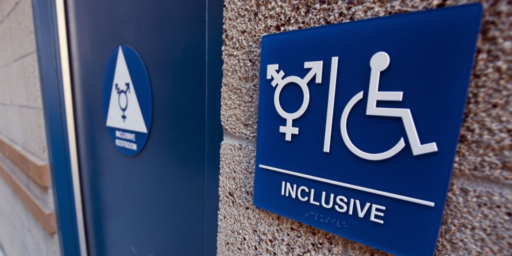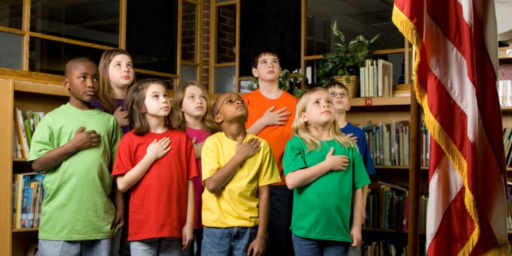Are Some Crimes More Equal Than Others?
Does the seriousness of a crime vary depending on the gender of the parties involved?
Two items in the news last week brought to mind an interesting, possibly troubling, legal and cultural phenomenon that many people seem to acknowledge, but nobody seems to be able to explain rationally. Both stories involved teachers having sexual relationships with High School students, and both of them just happened to come out of Louisiana (although there was a similar story originating in the Washington, D.C. suburbs of Virginia). What makes these cases still somewhat unique is that they involved female teachers involved with male students. In one case, one case involved a married 32 year old teacher and a 16 year old student. The other, at the same High School, involved two female teachers and another 16 year-old student who was apparently just about four days short of turning 17 at the time, which is relevant only because 17 is the age of consent in Louisiana. That last case was the subject of a badly written, innuendo filled piece at The Daily Caller that basically suggested that this student was the luckiest guy in the world.
That last sentiment is one that I encountered when I saw both of these cases discussed in online media — yes, I know this probably isn’t the best guide for evaluating human behavior —namely, the idea that even though it’s manifestly clear that all three of these women broke the law it wasn’t necessarily a big deal and, in the minds of some people, even something worth celebrating. As I pointed out during the exchanges over these cases, it seems blindingly obvious that the reaction would not be the same if we were talking about a male teacher and a 16yo female student. Indeed, it’s not hard to imagine that a scenario involving two male teachers and a female student, the words “gang rape” would be tossed around by some people. More importantly, though, there wouldn’t be very many people trying to defend the “relationship” or talking about how it might actually be a good thing for the student involved, both of which I saw on several occasions in the discussions about these Louisiana cases that I caught my attention over the past several days. Throw in the the possibility that the genders of the student and teacher are the same, of course, and the probability that we’d see that kind of reaction, especially in a state like Louisiana, and especially from apparent social conservatives who seemed to be the ones most frequently dismissing the severity of the offenses committed by these three teachers.
Obviously, the fact that we’re dealing with an adult female and a teenage male, rather than the reverse or any other same-sex scenario, is at the core of the differing reactions I’ve seen. Part of it, perhaps the majority of it, seems to be based in ideas of the sexuality of teenage boys that are quite different, even today, from what people like to tell themselves about the sexuality of teenager girls. Teenage boys are seen to be naturally sexually aggressive, while we like to tell ourselves that teenage girls are more mature and less sexually aggressive than men. It’s not too far a leap from there to the idea that these relationships between male students and female teachers are somehow different because, well, boys will be boys. Rationally, though, it doesn’t seem to me that there is any good reason to view these relationships differently. A relationship between an adult and someone under the age of consent is equally wrong regardless of the gender of the parties involved. A relationship between a teacher and a student in public or private secondary education is wrong regardless of the genders of the parties, and even outside the question of age, because of the unequal power relationships between the two parties. Treating one type of relationship, which is actually a crime, differently either legally or culturally makes little sense except to the extent that it is based upon outdated notions about sexuality and culpability. And yet, one cannot deny that the different perceptions exist in some quarters, and even that female teachers in these types of cases seem not to get sentenced as severely as male teachers although there is admittedly some evidence that this disparity may not be as large as people may think. That doesn’t really strike me as a good thing.







Obviously, if it does damage to the left, it doesn’t get reported.
For example… I note a shooting by a black cop against an unarmed white guy.
I’ll bet you haven’t heard of it.
No outrage.
No 24/7 coverage.
No riots.
NO BURNED OUT NEIGHBORHOODS.
@Eric Florack: That story was reported in the media about that shooting by a Black police officer of an unarmed White suspect. But, the story just didn’t have any legs with the public. In Ferguson, Missouri some community activists took an outrageous story of a young man who appeared to be on a weekend long episode of trouble including a robbery and an incident with a police officer where he was ultimately shot and killed into a political crusade. That story had to have enough Black residents who believed in a “victim complex”, “unequal justice”, and “racial profiling” to overlook that this young man was involved in a weekend of problems that would have landed him in jail or prison, instead making him into some symbol of claimed racism. – Likely, the police officer did not follow police procedure when he shot and killed the kid, but that seemed to be beyond the point of those who wanted to see more into this incident than there ever was. – What happened was what happened: A 18 year old kid was being a punk and got a policeman angry, who lost his cool, and the ugly incident then took place. But, it took a gullible public in Ferguson to read more into the tea leaves than was ever there to begin with. It proved that it was easy to convince some persons in Ferguson that they are victims of some sort of unequal justice, while in the case of White man shot by a Black police officer, the public is willing to give the police officer the benefit of the doubt that he probably made the right call in this situation. Further, it is a hard sell to make the public believe that Black police are targeting Whites to be shot. The public just doesn’t believe that. But, enough gullible persons believe that White police are targeting Blacks in Ferguson to create demonstrations and public unrest. – It all boils down to social psychology, and what people may believe perceive to be true.
I think there is a cultural disconnect-when older women have sex with teenage boys we often think the boy is living out teenage fantasy (basically every teenage boys dreams of sex with the older woman and they want it and aren’t victims) and/or we don’t see women as potential rapists.
Both of these are false. Teenage boys are just as much victims as teenage girls and women can and do rape. I actually think teacher/student relationships are among the most disturbing because teachers are in a position of power and can use emotions as well as their authority to manipulate their victims.
@PAUL HOOSON: heh.
And let’s remember, these deluded inDUHviduals vote.
Back in the early 1980’s–that’s 30 years ago for those marking their score cards–I knew a woman who did child abuse and rape investigations for Child Protective Services and the King County (Washington) Sheriff’s Office. At that time, she estimated that men probably got raped almost as frequently as women (using 1980s definitions, remember, and yes, I was surprised at that) and that boys were as likely to be sexually abused by their teachers as girls (also surprising to me). The more interesting part of the story was that men always refused to press charges because they believed (correctly she thought) that juries would refuse to convict because “it’s impossible to rape a man” and for fear that if the case made the press, they would lose face among their peers in business. As to female teachers abusing their male students, fathers simply refused to believe that their son’s could be victims–“he nailed his teacher? more power to him”–and even mothers were unconcerned except for the possibility of paternity issues–though they were a little annoyed at the possibility that the schools were hiring “sluts.”.
Any movement that society has made from those halcyon days is a good thing.
@Eric Florack:
And it’s tough to get a narrative going that there is institutionalized anti-white racism in Salt Lake City.
While I agree the crimes are equal and should be treated so, there is one substantive difference, the boys are highly unlikely to get pregnant.
@gVOR08:
But they can get their abuser pregnant and end up on the hook for child support when thy are too young to legally work.
I’m torn on this one. One of the cornerstones of criminal justice theory (at least the retributive prong of it) is that the severity of the punishment should be proportional to the severity of the harm caused by the crime. That’s why murder gets punished more severely than assault and punishments for theft crimes vary depending on the value of the goods stolen. So, if the harm suffered by a male teenager in these cases is generally less than the harm suffered by a female teenager in the same situation, then it makes sense – again, under the retributive model of justice – that the perpetrators should be punished less severely.
The question, then, is whether the harm to males is indeed generally less than to females. I agree with Doug’s point that the assumption that this is so is to a large extent attributable to outdated, sexist assumptions about male and female sexuality. However, the flipside is that this flawed cultural narrative nevertheless can influence the amount of harm suffered – if everyone is telling you how awesome it is, and what a lucky guy you are, there’s a good chance you’ll internalize that at least a bit and not feel as traumatized (if you feel traumatized at all) as you would if everyone was telling you how terrible it is and what a victim you are. So, if the teenager is a genuinely willing participant in the sex (I say “willing” rather than “consenting” to distinguish their personal intentions and desires from their legal capacity to consent), harm to a male teenager in that case is generally going to be less than the harm to a female teenager, so it’s not crazy to think the condemnation and punishment of the adult perpetrator should also be less.
On the other hand, if we move beyond retributive analysis to deterrence and incapacitation, or even to the much squishier idea that laws and punishments act as a statement of society’s collective values – in this case, the value that adults should not have sex with minors and the value that the law should not discriminate on the basis of gender – then any differences between the harm suffered by male and female victims don’t matter.
So, like I said, I’m torn. I think the reality is that, assuming willing participation, a male teenager will, on average, be less harmed than a female teenager in the same situation, and I don’t think it’s wrong for people to acknowledge that reality when commenting on these kinds of cases. I’m just not sure if the law should also recognize that difference.
@Just Me:
I agree completely with your earlier post, but this one no. A juvenile victim of sexual abuse by a teacher will not be on the hook for child support. If the child of the child is born, there will in all liklihood be an emotional connection and the child or his parents may feel some obligation, but the courts won’t enforce it.
@R.Dave:
or you will feel like you can’t tell anyone about your pain and be forced to internalize it in an unhealthy way. I’m sure you would never think to tell the victim of date rape or a more violent rape that things would be better for them if people would just tell them it was somehow a good thing that they should have enjoyed.
Why would you think the males would be more willing than the females?
@Grewgills:
Absolutely, and I don’t deny that. I’m speaking only in generalities and averages, and I think I’m on pretty solid ground when I say that social reinforcement and cultural narratives have a significant impact on how people generally perceive their experiences. Social/cultural scripts that characterize an experience as traumatic and exploitive will result in a larger percentage of people who have that experience perceiving it as such, while social/cultural scripts that characterize it as positive and rewarding will result in a larger percentage of people perceiving it in that way. In both cases there will be exceptions, and the specifics of the actual event will obviously be major factors which is why, again, I was careful to limit my comment to instances where the teenager is a willing participant.
I think you misread my post. I didn’t suggest that at all. I was saying that, assuming the teenager – whether male or female – is a willing participant, the cultural narrative and social reinforcement will tend to encourage a male teenager to retroactively perceive the experience in a positive way and female teenager to retroactively perceive the experience in a negative way. That said, there is also a solid argument to be made that social norms will tend to make female teenagers less likely to be completely willing participants in the first place. It’s not that they have any less sexual desire than their male peers; it’s that they are subjected to massive “slut-shaming” pressures that those male peers don’t have to deal with.
What do we know about how the conviction rates and types of sentencing compare in cases with a female perpetrator and male victim, vs. the reverse? Doug is talking about attitudes among the general public hearing about these cases, not the legal ramifications. When you have stories like this one: “A Texas judge gave the [male] defendant a 45-day sentence and five years of probation after implying that the [14-year-old female] victim was promiscuous,” it seems that “the victim wanted it” is sometimes applied to girls sexually abused by male teachers, too.
Considering that there were parts of the world where it is acceptable for teenage boys to be introduced to sex by taking them to prostitutes….
Yeah, I think we’re still with the traditional view that sex for teenage girls is evil and horrendous, but sex for teenage boys is virile and normal and something to be proud of.